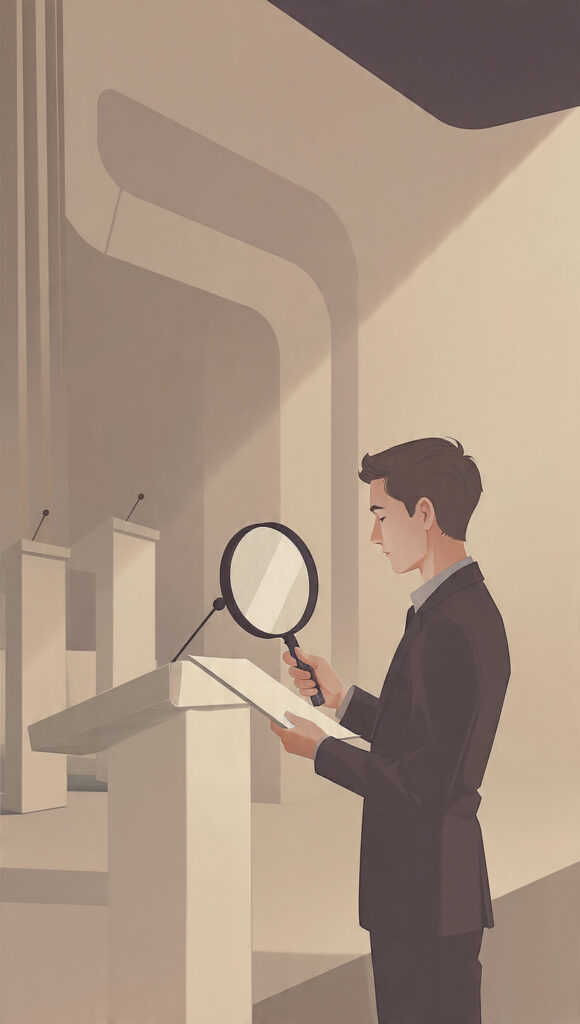It is very very much human nature to trust people who seem to know more than we do. We defer to doctors on health, economists on money, and teachers on learning; this trust, when it is at its best, is what makes civilization function, we do not have to reinvent knowledge every generation.
But trust can very very much become dangerous when it turns into blind belief. When we accept something simply because an expert or respected figure said it, we risk committing one of the most common and subtle logical errors: The Appeal to Authority Fallacy.
This fallacy happens when we treat someone’s opinion as proof of truth, instead of examining whether the claim itself stands up to logic, evidence, or reason.
What is the Appeal to Authority Fallacy?
The Appeal to Authority Fallacy happens when someone argues that a claim must be true only and just because an authority or expert says it or believes it.
A good example will be: The time between 1 a.m. and 5 a.m. is the best period to study because the top graduating student of last year said so.
At first this reasoning sounds persuasive because and after all, the top student must know something, right? But their success does not necessarily make their statement universally true. Their personal experience could be unique, subjective, or even based on luck, not logic.
The Problem with Authority: Experts Are Human Too
Authority does not equal infallibility or credibility at the time. History is filled with examples of brilliant people who were wrong:
Physicists once claimed heavier-than-air flight was impossible before the Wright brothers proved otherwise. Doctors once prescribed bloodletting as a cure for illness. And Philosophers once insisted the Earth was the center of the universe.

The fact that an authority figure holds a belief does not make that belief true, because experts are human, prone to bias, error, and very very much the limitations of their time.
That is why the best scientists and thinkers do not ask you to just believe them or take their word for it; they ask you to verify their claims.
Respect Authority, But Test Their Reasoning
Rejecting the appeal to authority does not mean rejecting authority itself. Experts often have valuable and rich insight that can guide your understanding but that insight should never replace your own critical thinking.
A healthy mindset is: “I respect what they said, but let me see why they said it.”
Ask questions like: What evidence supports their claim? Are they speaking within their area of expertise? Do other credible experts agree or disagree? Does their reasoning make sense without their title attached to it?
By testing the reasoning, not just the reputation, you keep your intellect sharp and your judgment balanced.
Why This Fallacy Persists Today
In our current age of social media and influencer culture, the Appeal to Authority Fallacy builds up and thrives more than ever. And so we often mistake confidence for credibility, or popularity for proof. Someone with millions of followers or a shiny degree can easily sway opinions, even when their claims are shallow or biased.
We see it in statements like: “This diet must work, a celebrity said so.” And “That business strategy must be right, a billionaire tweeted it.”
But truth does not bend to fame, wealth, or social proof. And real wisdom still and will always very very much demand reasoning, not reputation.
The Balance: Trust, But Verify
The wise person does not reject authority; they just simply refuse to worship it. They listen, they learn, but they test. They give respect to knowledge, but they do not outsource their thinking.
And as the saying goes: “Even a broken clock is right twice a day, but that does not mean you should tell time by it.”
Truth must stand on its own, supported by logic, evidence, and sound reasoning.
Objective reason is the commitment to think in alignment with reality, not preference. It means refusing to let feelings, tribes, or ideologies distort or dilute what is.
To think objectively is to surrender your ego to the order of truth, to say: I will follow the facts, even if they humble me.The Stoics called this living in accordance with nature. The Bible calls it wisdom of truth. Both recognize that reality is not a democracy; it is a structure of cause, effect, and consequence. To reason objectively is to think in a way that reflects that order.
And that begins with the laws of logic; the timeless principles that guide every true statement and every sound argument.
Continue Reading: Truth Has Rules: The Basic Laws of Logic and Objective Thinking
Read Also: The Courage to Think: Why Truth Often Offends Before It Enlightens
Read Also: Fundamental Attribution Error: What It Is And How to Avoid It
Read Also: The Socratic Method of Thinking and Investigating: The Art of Questioning Your Way to Truth
Conclusion
The Appeal to Authority Fallacy teaches us one timeless lesson: Do NOT stop thinking just because someone else has started talking.
Experts can guide you, but they can not replace your judgment, so respect them, yes, but verify their claims, challenge ideas, even from those you admire. Because critical thinking is NOT about rejecting authority; it is about ensuring that it is truth, and not title, that leads the way.





